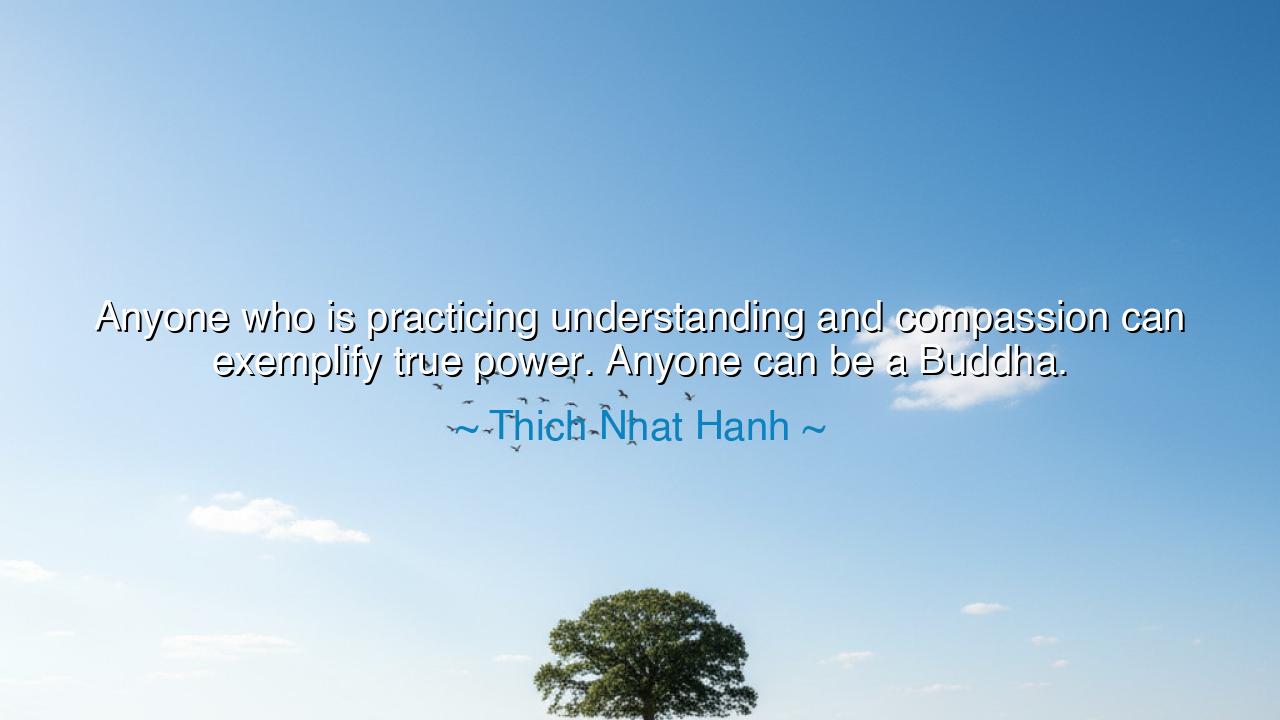
Anyone who is practicing understanding and compassion can
Anyone who is practicing understanding and compassion can exemplify true power. Anyone can be a Buddha.






The words of Thích Nh?t H?nh—“Anyone who is practicing understanding and compassion can exemplify true power. Anyone can be a Buddha.”—shine as a lantern upon the darkened path of humanity. They remind us that true power is not found in conquest, nor in wealth, nor in crowns of gold, but in the quiet radiance of understanding and compassion. To be gentle is not weakness; it is the greatest strength, for it transforms conflict into peace and hatred into love.
This utterance proclaims the radical truth of universality. The state of the Buddha, often seen as distant and exalted, is not reserved for kings, sages, or saints alone. It is open to all who walk the earth—child, farmer, servant, ruler. By practicing compassion and seeking to understand rather than to dominate, anyone may awaken to this power. It is not a gift given from above, but a seed already within, awaiting the rain of practice to bloom.
History reveals this lesson in the life of Emperor Ashoka of India. Once a conqueror who spilled rivers of blood, he came to see the futility of violence after the Battle of Kalinga. Turning to the teachings of the Buddha, he renounced cruelty and embraced compassion, spreading peace and wisdom throughout his realm. His empire endured not because of the sword, but because he chose to embody understanding. In his transformation, we see the truth of Thích Nh?t H?nh’s words: power rooted in compassion outlasts power rooted in fear.
The quote is also a rebuke to pride. Many seek greatness through domination, imagining themselves powerful when they can command others. Yet such power is brittle, collapsing when fear fades or when rivals rise. The power of compassion, however, is indestructible, for it does not depend on force but on the natural strength of love. It heals rather than wounds, and because of this, it multiplies itself endlessly in the hearts of others.
Let this teaching endure for future generations: to live with understanding is to dissolve anger, to live with compassion is to dissolve cruelty. In doing so, you awaken the Buddha within yourself, regardless of birth, station, or creed. For the path to true power lies not in towers or thrones, but in the simple act of choosing kindness, again and again, until the world itself is transformed. Thus does Thích Nh?t H?nh remind us that the mightiest conquest is not over others, but over the self.






TNMai Thao Nhi
I feel inspired yet challenged by this quote. It’s easy to admire compassion in theory, but practicing it consistently is another story. It makes me question my own reactions—how often do I respond with understanding instead of defensiveness? Maybe the idea isn’t to reach perfection, but to approach life with the intention of awakening kindness. That alone might be the quiet power Thich Nhat Hanh is talking about.
PTNhung Phung Thi
There’s something deeply comforting about this perspective. It suggests that anyone—regardless of religion, education, or status—has the potential for spiritual greatness. But I can’t help wondering, what does it really mean to 'be a Buddha' in practical terms? Is it about living without judgment, or is it about seeing through the illusions of ego and fear? The simplicity of the message hides a profound challenge.
SSon
What stands out to me here is the idea that compassion equals power. It’s such a radical thought in today’s world of competition and ego. It makes me wonder, if everyone practiced understanding before reacting, would conflict even exist on the same scale? I’d love to explore how this concept could be applied in politics, business, or even social media interactions where empathy often feels absent.
Hhonguyenkhanhngoc
I find this statement both humbling and empowering. It implies that enlightenment isn’t reserved for monks or spiritual leaders—it’s something we can all touch through kindness. But how realistic is it in modern life, when everything feels rushed and stressful? Can someone living an ordinary life—working, parenting, dealing with bills—really embody that kind of peace and compassion every day?
YNLe Huynh Yen Nhi
This quote makes me think about how we often equate power with dominance or control, but Thich Nhat Hanh flips that idea completely. He suggests that true power lies in compassion and understanding—qualities we tend to overlook in a competitive world. Do you think society could ever truly value these traits as much as money or influence? It feels like a call to redefine what strength really means.